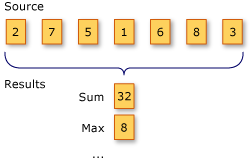集計操作 (Visual Basic)
集計の操作では、値の集合体から単一の値が計算されます。 たとえば、1 か月分の毎日の気温値から 1 日あたりの平均の気温値を計算することが集計操作です。
次の図は、数値のシーケンスに対する 2 つの集計処理の結果を示しています。 最初の処理で数値が合計されます。 2 つ目の処理でシーケンスの最大値が返されます。

次のセクションでは、集計処理を実行する標準クエリ演算子メソッドの一覧を示します。
メソッド
| メソッド名 | 説明 | Visual Basic のクエリ式の構文 | 説明 |
|---|---|---|---|
| Aggregate | コレクションの値に対してカスタム集計処理を実行します。 | 該当なし。 | Enumerable.Aggregate Queryable.Aggregate |
| 平均 | 値のコレクションの平均値を計算します。 | Aggregate … In … Into Average() |
Enumerable.Average Queryable.Average |
| カウント | コレクションの要素数をカウントします。述語関数を満たす要素のみをカウントすることもできます。 | Aggregate … In … Into Count() |
Enumerable.Count Queryable.Count |
| LongCount | 大規模なコレクションの要素数をカウントします。述語関数を満たす要素のみをカウントすることもできます。 | Aggregate … In … Into LongCount() |
Enumerable.LongCount Queryable.LongCount |
| Max または MaxBy | コレクション内の最大値を決定します。 | Aggregate … In … Into Max() |
Enumerable.Max Enumerable.MaxBy Queryable.Max Queryable.MaxBy |
| Min または MinBy | コレクション内の最小値を決定します。 | Aggregate … In … Into Min() |
Enumerable.Min Enumerable.MinBy Queryable.Min Queryable.MinBy |
| Sum | コレクション内にある値の合計を計算します。 | Aggregate … In … Into Sum() |
Enumerable.Sum Queryable.Sum |
クエリ式の構文例
平均
次のコード例では、Visual Basic の Aggregate Into Average 句を使用して、温度を表す数値配列の平均温度を計算します。
Dim temperatures() As Double = {72.0, 81.5, 69.3, 88.6, 80.0, 68.5}
Dim avg = Aggregate temp In temperatures Into Average()
' Display the result.
MsgBox(avg)
' This code produces the following output:
' 76.65
カウント
次のコード例は、Visual Basic の Aggregate Into Count 句を使用して、80 以上の値が配列に何個含まれるかをカウントします。
Dim temperatures() As Double = {72.0, 81.5, 69.3, 88.6, 80.0, 68.5}
Dim highTemps As Integer = Aggregate temp In temperatures Into Count(temp >= 80)
' Display the result.
MsgBox(highTemps)
' This code produces the following output:
' 3
LongCount
次のコード例は、Aggregate Into LongCount 句を使用して、配列に含まれる値の数をカウントします。
Dim temperatures() As Double = {72.0, 81.5, 69.3, 88.6, 80.0, 68.5}
Dim numTemps As Long = Aggregate temp In temperatures Into LongCount()
' Display the result.
MsgBox(numTemps)
' This code produces the following output:
' 6
最大
次のコード例では、Aggregate Into Max 句を使用して、温度を表す数値配列の最高温度を計算します。
Dim temperatures() As Double = {72.0, 81.5, 69.3, 88.6, 80.0, 68.5}
Dim maxTemp = Aggregate temp In temperatures Into Max()
' Display the result.
MsgBox(maxTemp)
' This code produces the following output:
' 88.6
Min
次のコード例では、Aggregate Into Min 句を使用して、温度を表す数値配列の最低温度を計算します。
Dim temperatures() As Double = {72.0, 81.5, 69.3, 88.6, 80.0, 68.5}
Dim minTemp = Aggregate temp In temperatures Into Min()
' Display the result.
MsgBox(minTemp)
' This code produces the following output:
' 68.5
SUM
次のコード例では、Aggregate Into Sum 句を使用して、経費を表す値の配列から経費の総額を計算します。
Dim expenses() As Double = {560.0, 300.0, 1080.5, 29.95, 64.75, 200.0}
Dim totalExpense = Aggregate expense In expenses Into Sum()
' Display the result.
MsgBox(totalExpense)
' This code produces the following output:
' 2235.2
関連項目
GitHub で Microsoft と共同作業する
このコンテンツのソースは GitHub にあります。そこで、issue や pull request を作成および確認することもできます。 詳細については、共同作成者ガイドを参照してください。
.NET
